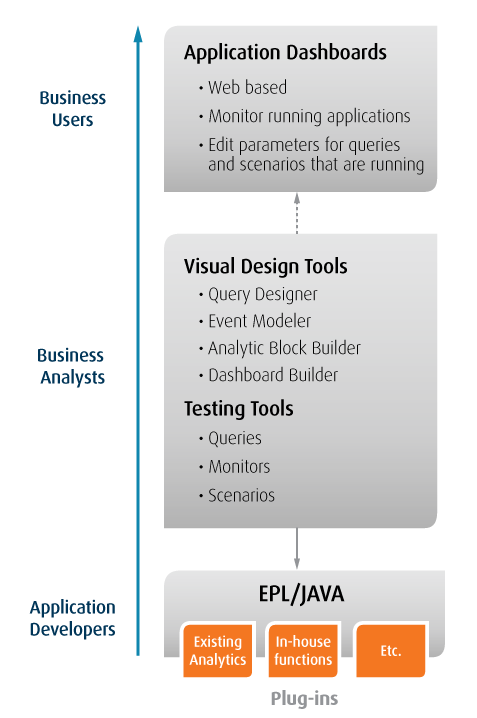Understanding the different user viewpoints
Apama has been designed for a range of users. The figure below shows the spectrum of users from application developers to business analysts to pure business users. Apama provides different facilities for each of these classes of user. After the initial design is set for an Apama application, multiple users can work concurrently to implement the design.
Application developers can make use of the full set of APIs and technologies within the Apama architecture to create sophisticated, custom, CEP solutions. Using Software AG Designer, they can create applications directly in EPL or Java. They can extend the capabilities of the Apama correlator with their own in-house analytic routines. Using the Integration Adapter Framework (IAF), they can integrate with a new data service by developing a new adapter if one that can be plugged in does not already exist. They can also take advantage of low-level APIs for building custom client user interfaces in C, C++, Java and .Net.
Business analysts are provided with GUI tools (Query Designer, Event Modeler, Analytic Block Builder, Dashboard Builder) to enable the creation of queries, scenarios and dashboards without having to write code. A query is a self-contained processing unit suitable for applications where the incoming events provide information updates about a very large set of real-world entities. A scenario is a sequence of event monitoring and event responses that constitutes a single business activity. A query or a scenario can be an application in its own right, or part of a bigger application. Both Query Designer and Event Modeler provide features for creating reusable application components (parameterized queries in Query Designer and smart blocks in Event Modeler).
Thus, there are several approaches to developing Apama applications. Your development team can use one, two, three or all four in an Apama application:

EPL — Apama’s native event processing language

Queries — Use EPL and the Query Designer GUI to create Apama query applications

Java — Apama provides an in-process API for Java (called JMon) for processing events

Event Modeler — Apama’s GUI for creating event processing scenarios
Pure business users are often only interested in the end-game application. The output of the Dashboard Builder GUI provides an immediately usable application for this purpose.
In addition, Apama provides management and monitoring tools for users whose primary responsibility is to configure, deploy and manage Apama applications.

